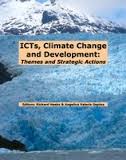ICTs, Climate Change and Development: Themes and Strategic Actions/Case Evidence

These two reports are based on the outcomes of a project on “Climate Change, Innovation and ICTs”. They conceptualize and illustrate the nexus among these three themes.
The first part on Themes and Strategic Actions presents an overview model as a tool of analysis and examines its components (mitigation, adaptation, strategy and monitoring). Subsequent chapters explore their linkages. What becomes clear is that the three fields interact in complex ways, shaped by the strong and sometimes conflicting interests of public, private and civic stakeholders. As such, they require careful examination. The chapters describe challenges such as adapting to acute and chronic climate change impacts, considering the lack of infrastructure in the most vulnerable environments, and ensuring that low- and middle-income countries have access and capacities to use ICTs for climate change mitigation.
Disaster management and low-cost technologies are recurrent themes that are relevant for the triple nexus. Chapter 5, for example, analyses the role of ICTs – such as radio and television – to communicate disaster alerts to the “last mile”; to allow for reliable and rapid two-way communication of information and data even in remote and damaged areas; and to facilitate a transparent way of gathering and allocating resources for disaster management. New and emergent ICTs such as wireless sensor networks, GIS and web-based tools, and the use of mobile phones for monitoring environmental change, managing disasters and adapting to climate change are discussed in Chapter 8 to identify potential benefits and areas for application.
The authors highlight the need for the inclusion of multiple stakeholders. They particularly make the case for obtaining community commitment and designing innovative applications that are suitable for the affected localities. They also examine evidence on the structure, content and processes of formulating and implementing inclusive policies using inter- and multidisciplinary approaches.
The second part, Case Evidence, provides concise descriptions of 20 case studies that address the various intersections among the fields of ICT, development, climate adaptation and mitigation. These provide insights into costs, enabling and critical factors, successes and failures.
Clustered according to various topic areas and drawn from many countries and continents, examples of cases include the role of ICTs in early warning of climate-related disasters in Sri Lanka, the application of participatory videos for monitoring and evaluating community-based adaptation in Southern Africa and the reduction of carbon emissions through videoconferencing in the state of Orissa in India.
Available at:
http://www.niccd.org/sites/default/files/Book_ICCD_Themes_Actions.pdf; http://www.niccd.org/sites/default/files/Book_ICCD_Case_Evidence.pdf
Book note prepared by Julia Wesely
Search the Book notes database
Our Book notes database contains details and summaries of all the publications included in Book notes since 1993 - with details on how to obtain/download.
Use the search form above, or visit the Book notes landing page for more options and latest content.
For a searchable database for papers in Environment and Urbanization, go to http://eau.sagepub.com/

